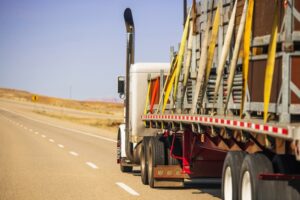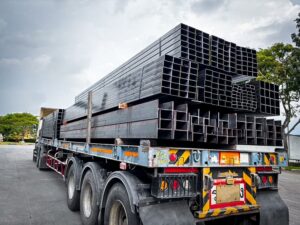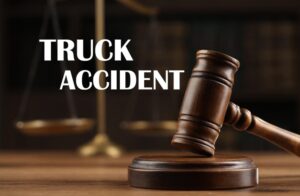Falling cargo accidents are among the most dangerous incidents on the road, often leading to severe injuries or fatalities. When improperly secured cargo falls from a truck or other vehicle, it creates a cascade of risks for unsuspecting drivers. You might be left wondering who’s responsible, what your legal options are, and how a truck accident lawyer can help you seek justice.
The following information will help you find answers.
How Falling Cargo Can Cause Deadly Accidents
Cargo falling from trucks or trailers can strike vehicles directly, cause drivers to swerve dangerously, or litter the road with debris that other motorists can’t avoid. The consequences often include catastrophic crashes, pile-ups, and tragic loss of life.
Improperly secured cargo isn’t just a minor oversight – it’s a breach of safety regulations and a failure to take reasonable precautions. Drivers, trucking companies, and cargo handlers are responsible for ensuring that loads are safe and secure before hitting the road.
Common Causes of Falling Cargo Accidents
Falling cargo accidents aren’t random occurrences – they often result from specific failures that could have been prevented. Identifying the common causes behind these incidents shows how they might have been avoided and who may bear responsibility. Below are the key factors that contribute to falling cargo accidents.
Improperly Secured Loads

One of the most frequent causes of falling cargo is improper securement. Federal Motor Carrier Safety Administration (FMCSA) regulations provide detailed guidelines for securing loads, requiring appropriate tie-downs, straps, and other devices to prevent movement during transit. The consequences can be disastrous when drivers or cargo handlers fail to follow these rules.
In many cases, faulty straps or improperly applied tie-downs allow cargo to shift or completely detach from the vehicle. Even minor errors (such as securing items at the wrong angle or failing to tighten a strap sufficiently) can lead to catastrophic accidents. Such lapses demonstrate a failure to uphold basic safety standards.
Overloaded or Improperly Balanced Cargo
Cargo weight limits and distribution are critical for maintaining vehicle stability. When a truck is overloaded, or its cargo is unevenly distributed, the likelihood of a falling cargo incident increases significantly. Excess weight can strain securement devices, making them more likely to fail under normal driving conditions.
In addition, improperly balanced cargo affects the truck’s center of gravity. An unbalanced load increases the risk of tipping or shifting during turns, sudden stops, or lane changes. Even if the cargo doesn’t fall immediately, these stability issues create unsafe conditions for the truck and other vehicles.
Defective Equipment

Securement equipment like straps, chains, and tarps is crucial in keeping cargo safely in place. However, when this equipment is defective or poorly maintained, it fails to provide the necessary level of security. Equipment wear and tear, such as frayed straps or rusted chains, significantly weakens their effectiveness.
In some cases, manufacturers may bear responsibility if the equipment was defective from the start. Whether the issue arises from poor maintenance or faulty design, defective equipment often sets the stage for falling cargo accidents.
Driver Negligence
Drivers must conduct pre-trip inspections to ensure cargo is properly secured before hitting the road. Negligence in this duty can directly contribute to accidents. Skipping inspections, ignoring warning signs of instability, or failing to stop and adjust the load after noticing a problem are all examples of driver-related errors that lead to falling cargo.
Drivers must also remain vigilant during transit. Sudden braking, sharp turns, or aggressive driving can worsen existing issues with cargo securement.
Improper Loading Practices
Another critical point where errors often occur is the loading process. Cargo handlers are tasked with arranging and securing loads in compliance with safety standards. The risks increase significantly when they fail to stack items correctly or use adequate securement devices.
Placing heavy items on top of lighter ones or failing to distribute weight evenly can create instability. Once the vehicle is on the move, these mistakes can cause cargo to shift, leading to accidents that endanger everyone on the road.
Types of Cargo That Pose the Greatest Risks
When cargo falls from a vehicle, the consequences can vary depending on what’s being transported. Certain types of cargo pose a greater threat due to their size, weight, or hazardous properties. Here are some examples of cargo that frequently lead to accidents when they fall.
Construction Materials

Construction materials such as steel beams, lumber, and concrete blocks are among the most dangerous items when improperly secured. These materials are typically heavy, bulky, and solid, causing significant damage upon impact. If a steel beam or a stack of lumber falls onto a vehicle, the resulting collision can be catastrophic, leading to severe injuries or fatalities.
In addition to direct impacts, fallen construction materials can block roadways, creating hazards for other drivers who may swerve to avoid them. These accidents often result in multi-vehicle collisions, amplifying the damage.
Industrial Equipment
Industrial equipment and heavy machinery present unique securement challenges due to their irregular shapes and substantial weight. These items often require specialized straps, chains, or cradles to remain stable during transport. However, failures in securement can lead to deadly accidents.
When industrial equipment falls, it can crush vehicles or cause severe roadway obstructions. Drivers attempting to avoid such debris may lose control of their vehicles, leading to further crashes. The sheer size and weight of these items often result in significant destruction.
Hazardous Materials

Hazardous materials, such as chemicals, flammable gases, and other dangerous substances, pose risks beyond physical collisions. Spills or leaks caused by falling cargo can lead to fires, explosions, or toxic fumes, endangering motorists and emergency responders.
Hazardous material spills can have long-term environmental and public health consequences in addition to the immediate physical risks. These incidents often require extensive cleanup efforts and may shut down entire roadways for prolonged periods.
Consumer Goods
While consumer goods like furniture, boxed items, or home appliances may seem less dangerous, they can still cause significant accidents. Even smaller items falling onto the road can create serious hazards, especially at high speeds. Drivers may swerve to avoid these objects, leading to loss of control and collisions.
Moreover, when these goods strike vehicles directly, they can damage windshields or harm occupants, further escalating the severity of the incident.
The Devastating Impact on Victims and Families
When cargo falls from a truck, it often leaves victims in life-altering situations. The physical injuries can range from broken bones to traumatic brain injuries, and the emotional toll is equally significant. For families who lose a loved one in a falling cargo accident, the pain of sudden loss is compounded by financial strain, unanswered questions, and a sense of injustice.
Liability in Falling Cargo Accidents
Liability in falling cargo accidents often involves multiple parties, each with distinct responsibilities. Identifying who is at fault requires a detailed investigation into the circumstances leading up to the incident. Below are the potential parties who might be liable.
The Truck Driver
Drivers must ensure cargo is secure before hitting the road. Federal regulations require pre-trip inspections to identify any issues with load stability. If a driver skips these checks, ignores signs of instability, or fails to address shifting cargo during transit, they may be held liable for accidents that follow.
The Trucking Company
Trucking companies are often accountable for their drivers’ actions and the condition of their vehicles. If they neglect to train employees, prioritize delivery speed over safety, or fail to maintain the securement of equipment, they may share liability. Truck accident lawyers can also hold employers responsible for their drivers’ negligence while on the job.
Cargo Loaders
In many cases, third-party contractors handle the loading process. If improper loading techniques or inadequate securement methods contributed to the accident, these cargo handlers might bear responsibility.
Equipment Manufacturers
Defective securement devices, such as straps, chains, or tarps, can lead to falling cargo. In such cases, the equipment manufacturer may be liable under product liability laws for selling faulty products.
Government Entities
When road conditions play a role – such as poorly maintained surfaces or inadequate signage at construction zones – government agencies may share blame for failing to provide a safe driving environment.
Why Falling Cargo Accidents Are Preventable
Falling cargo accidents don’t have to happen. Most of these incidents stem from avoidable mistakes or outright negligence. The FMCSA regulations mentioned earlier were created to prevent cargo from shifting, breaking loose, or falling during transit. When properly followed, these rules outline specific requirements for securing cargo, conducting inspections, maintaining equipment, and ensuring safety.
The foundation for prevention lies in a commitment to safety across all levels of the trucking industry. Drivers, trucking companies, and cargo handlers must prioritize proper training and adherence to safety standards. Regular inspections of securement devices, including straps and chains, are also essential. Quality equipment must be used and maintained to prevent failures during transit.
However, when safety is ignored in favor of cutting corners, innocent motorists bear the burden. The financial, physical, and emotional toll of these accidents is immeasurable, particularly when they result in fatalities. Holding negligent parties accountable helps victims and sends a strong message to the trucking industry that these lapses won’t go unpunished.
How a Truck Accident Lawyer Can Help

If you’ve lost a loved one due to falling cargo, a truck accident lawyer can be a powerful ally in your pursuit of justice. Falling cargo accidents often involve multiple parties, including truck drivers, cargo loaders, and equipment manufacturers. Determining who is at fault requires a thorough investigation and a deep understanding of federal and state laws governing commercial trucking.
An attorney can evaluate the unique circumstances of your case and identify all liable parties. Whether it’s the driver’s failure to inspect the cargo, the trucking company’s neglect of proper training, or a manufacturer’s defective equipment, your lawyer will build a case to recover compensation for your losses.
Legal representation also means navigating the challenges of insurance companies and defense lawyers. Trucking companies often have large legal teams working to reduce their liability. A truck accident lawyer can anticipate and counter these tactics, ensuring your claim is presented with compelling evidence that leaves little room for dispute.
The Importance of Prompt Action
Time is of the essence after a falling cargo accident. Evidence can quickly disappear, especially on busy highways where debris is cleared shortly after a crash. Witnesses’ memories fade, and critical details may be lost as days or weeks pass. In addition, the statute of limitations sets a legal deadline for filing a claim, which varies by state.
Hiring a truck accident lawyer immediately ensures your case is thoroughly investigated. Attorneys can gather and preserve evidence, including photographs of the scene, inspection reports, and witness statements, to strengthen your claim. They can also issue subpoenas to access records from trucking companies, such as driver logs and cargo securement protocols. Acting quickly maximizes the chances of building a strong case.
Common Defenses Used by Trucking Companies
Trucking companies and their insurers often attempt to deflect blame in falling cargo cases. Understanding these common defenses can highlight why legal representation is so important:
- Following too closely: Companies may argue that you were driving too close to the truck, making it impossible to avoid the fallen cargo.
- Unpredictable road conditions: They might claim that bad weather, potholes, or other road hazards made the accident unavoidable.
- Third-Party Liability: Another frequent tactic is to blame third parties, such as cargo loaders or equipment manufacturers, to reduce their share of liability.
A truck accident attorney can counter these arguments by presenting evidence highlighting negligence by the trucking company, driver, or other responsible parties. For example, inspection records might show that the driver skipped mandatory checks, or securement equipment might be shown to have been visibly worn or defective.
Finding Justice After a Falling Cargo Accident
Holding negligent parties accountable for a falling cargo accident can provide a sense of justice and financial relief. A personal injury lawyer will fight tirelessly to ensure your voice is heard and your losses are recognized.
By understanding the causes, consequences, and legal avenues available after a falling cargo accident, you can take meaningful steps toward recovery and justice. Seeking guidance from a skilled attorney can make all the difference in your case. Get in touch with a legal professional for a free case evaluation.
